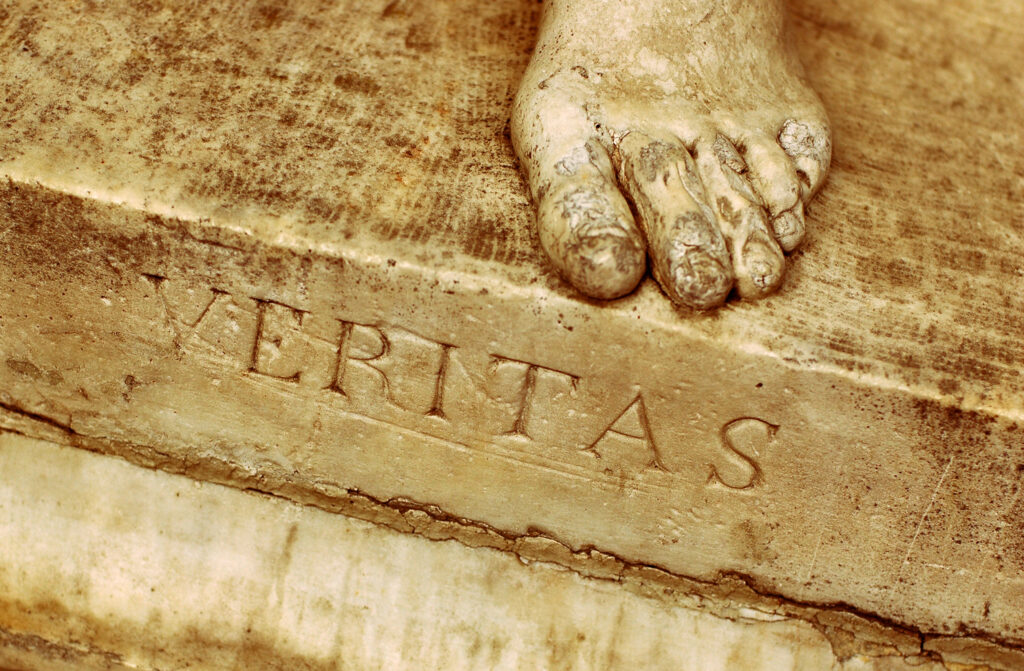In a culture marked by bias and riven by ideology, institutes of higher education must return to their original mission: the pursuit of truth.
In their popular podcast, “All-In,” tech investors David Sacks, Chamath Palihapitiya, Jason Calacanis, and David Friedberg discussed the launch of Google’s new artificial intelligence platform, “Gemini.” In just a few short days, the technology behemoth has come under attack for widespread ideological biases uncovered when users requested anything from a picture of George Washington to the latest information on the legal cases facing Donald Trump and Hunter Biden.
As the hosts cited Google’s “Objectives for AI Application” (from their own website), which include imperatives such as “Be socially beneficial” and “Avoid creating or reinforcing unfair bias,” the dogmatic results from seemingly innocuous search terms prompted Sacks to blurt out, “Where is the telling of the truth? Where is that value?” The withering critiques of Gemini continued until the group wondered whether the entire enterprise should be scrapped and restarted, with a new mission proposed by Calcanis: “To help people find the truth.” Far from contributing to Google’s bottom line, the hosts wondered whether the revelations of an ideologically captured company may end up destroying one of the world’s largest companies.
It's worth noting that the engineers who built these biases into Gemini are some of the most highly educated people in the world, engaged in a collaborative process (software development) that is known for rigorous testing and retesting. Apparently, so deep was the groupthink that until the program was released to public scrutiny, no one within Google detected the prejudices they had embedded in it.
The search for truth has assumed center stage in an American culture marked by “fake news,” “disinformation,” and biased technology platforms. In times such as these, truth-seeking institutions must recommit themselves to that original mission, and be held accountable to it by citizens and supporters.
This need is particularly great in American higher education, which is tasked with not only a research mission in truth-finding but also a teaching mission to prepare truth-seekers. To look at the mottos of America’s great colleges and universities is to see this value extolled over and over again. From Harvard’s “Veritas” to the California State University System’s “Vox Veritas Vita” (“Speak the truth as a way of life”), many of our colleges and universities proclaim a commitment to the truth. At my own Pepperdine University, one of our affirmation statements announces, “That the truth, having nothing to fear from investigation, should be pursued relentlessly in every discipline.” Of course, many of these mottos are further grounded in Scripture, acknowledging (even in what are today secular institutions) that all truth is derived from God’s Truth. From CalTech’s “The truth shall make you free” (John 8:32) to Columbia University’s “In Lumine Tuo Videbimus Lumen” (“In thy light we see light” —Ps. 36:9), we see the foundation of truth set in the transcendent.
The corruption of this original mission in academia is profound, with consequences for America’s future. It had once been thought that the ideological experimentation students undergo during four (or more) years at university would eventually be tempered by the traditional maturing institutions of career and family, but the recent shocks of the COVID pandemic and the response to the October 7th atrocities have awakened many to how far their alma maters have departed from their mottoes.
At the same time, alumni, parents, donors, and policymakers are engaged in one of the more exciting movements in the history of American higher education. From new civics institutes launched at public universities—like the University of Florida’s Hamilton Center, the University of Tennessee’s Institute of American Civics, and the University of Texas’s Civitas Institute (and others)—to the creation of entirely new schools, like the University of Austin, civil society is working to return higher education to its original mission: the pursuit of truth.
In fact, it might not be too strong a word to describe these efforts as a “revolution” in academia, as I’m reminded by my dearly departed friend and longtime faculty member here at the policy school, Ted McAllister, who preferred to use the word in its astronomic sense, as “the returning of a celestial body to its original position.”
Throughout American history, citizens, acting together through civil society, have formed and reformed wondrous institutions that—in their essence—have been truth-seeking. When it comes to the educational sphere, these investments have a two-fold implication: helping us all make sense of the world around us while also preparing a new generation of citizens to pursue truth in a world riven by ideology.
On October 23rd and 24th, 2024, the Center for Civil Society's fourth annual Givers, Doers, & Thinkers conference will convene in Malibu, CA, on the campus of Pepperdine University, with the theme: "K to Campus: How the Education Reform Movement Can Reshape Higher Ed." Donors, nonprofit leaders, and scholars from across the country will gather to discuss subjects such as K-12 education, free speech on college campuses, proposals for higher education reform, and how donors can successfully work with college and university partners to create gift agreements that honor donor intent. Learn more, and register to attend, here.



